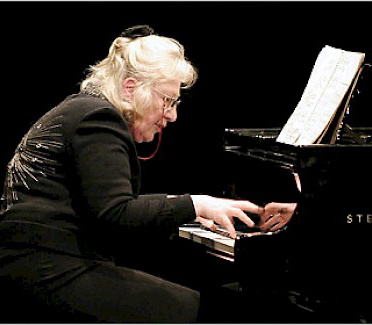Oppens winning with Carter, mixed with others at Bargemusic

Ursula Oppens performed Sunday at Bargemusic.
Rachmaninoff a soulmate of Elliott Carter? That was just one of the questions raised by Ursula Oppens’s recital program Sunday afternoon at Bargemusic, in which the esteemed exponent of contemporary piano music interleaved pieces by Carter with those of earlier 20th-century masters.
The prospect of hearing Oppens, whose Carter credentials include a Grammy nomination for her 2008 recording of the composer’s complete solo piano works, bring the likes of Stravinsky, Rachmaninoff, and Debussy into the Carter conversation was intriguing, to say the least.
Stravinsky was, after all, the looming presence in the celebrated composition class of Nadia Boulanger when Carter attended it in the 1930s. And another Boulanger pupil, the critic and composer Virgil Thomson, referred to Debussy as nothing less than the Beethoven of the 20th century—“our blinding light, our sun, our central luminary.”
As for Rachmaninoff, well, one can at least say that the lush, Hollywood-style music he’s best known for eventually gave way to something far drier, wittier and more sardonic— in other words, more “modern.”
And all these worthies did sound a bit like Carter in Sunday’s performance—not, unfortunately, because of newly-discovered connections in the music itself, but because of Oppens’s difficulty shifting gears from her main man into the other composers’ idioms.
The most successful transition occurred at the beginning of the program, as Carter’s 90+–a delightfully dry martini stirred up in honor of the composer Goffredo Petrassi’s 90th birthday in 1994—segued into Stravinsky’s Piano Sonata of 1924. The piquant Carter was nicely set off by the neoclassical Stravinsky of 70 years before, rendered fluently by Oppens in a style that was objective but not mechanical.
Each of Carter’s Two Diversions, composed in 1999 when Carnegie Hall requested pieces “for young players” (good luck, kids!), expresses a characteristic Carter idea: different musical actions going on simultaneously. Oppens’s transparent playing made this concept wonderfully audible.
Despite their schoolish title, Rachmaninoff’s Etudes-Tableaux Op. 33 are not for beginners either. Their thick, often dissonant textures were stylistically advanced for 1911, when the composer was still just 38 years old. In a selection of four of them (Nos. 2, 8, 5, and 6), Oppens’s formidable technique enabled her to render the blizzards of notes with only a little blurring, and she sensed the quirky ebb and flow of each piece well. What eluded her were the crystalline leggiero that puts the zing in Rachmaninoff’s sardonic wit and the deep touch needed for the music’s occasional relapse into old-school lushness and sentiment.
Retrouvailles, Carter’s 75th-birthday tribute to Pierre Boulez, used musical notes in the honoree’s name to generate a lot of booming and swirling, lasting about a minute and a half. Oppens’s assured performance gave it punch and exuberance.
The program then dialed back nearly a century, from 2000 to 1905, for the three pieces of Debussy’s Images, Book I. Oppens’s rather brittle tone sounded particularly unsuited to “Reflets dans l’eau”—one heard not light and water, but hammers and strings. “Hommage à Rameau”—not neoclassical in style but at least inspired by an 18th-century composer—fared better, but could have used more colors in the mix. The pianist’s lack of a leggiero touch kept the whirring machine of “Mouvement” earthbound.
What if the whirring notes of “Mouvement” flew off their axle and went spinning up hill and down dale and all around the town? You might get something like Carter’s blistering toccata Caténaires, written in 2006, when the composer was 98. Oppens tossed off this jaw-dropper with panache to close the program.
One should, of course, never pass up an opportunity to hear this eminent Carterian play the great composer’s music. But her difficulty with some of the other items on the program made one wonder: What if a pianist came along who did have all those other colors and touches in her bag? What would her Carter sound like?
Bargemusic’s Masterworks Series continues with “Thelonious Monk: The Complete Works” with pianist Jed Distler, 7 p.m. Friday, and chamber music by Haydn and Mozart, 8 p.m. Saturday and 4 p.m. Sunday.bargemusic.org; 800-838-3006.


